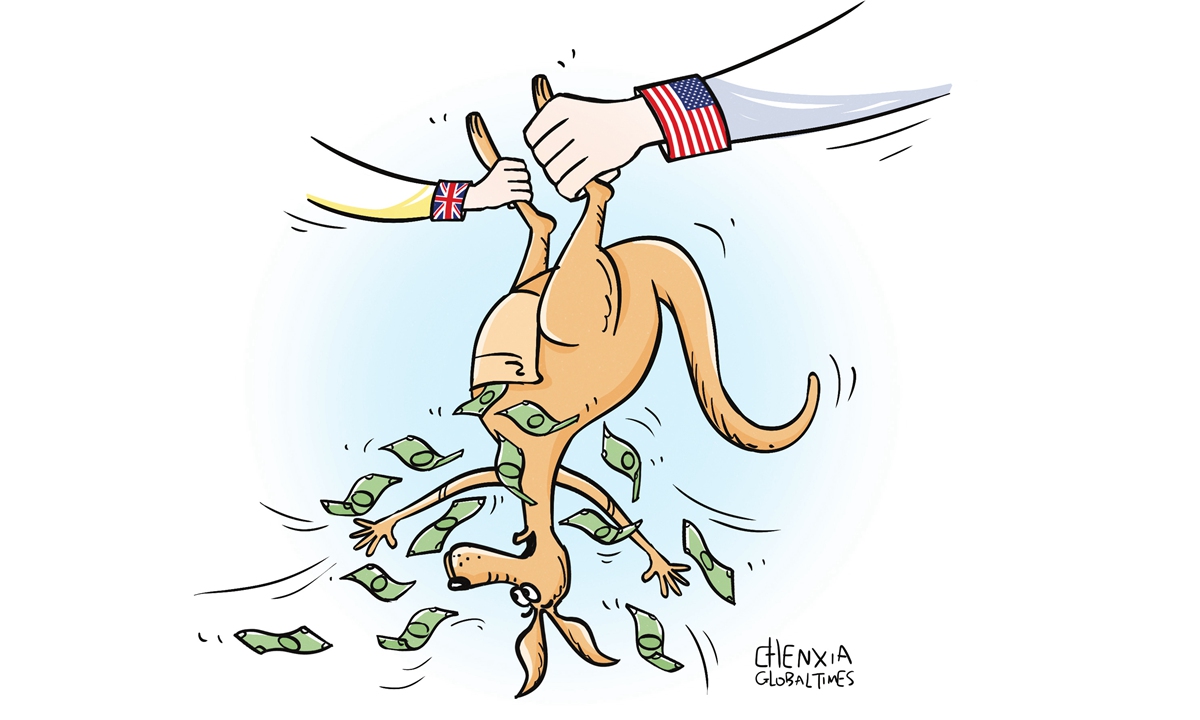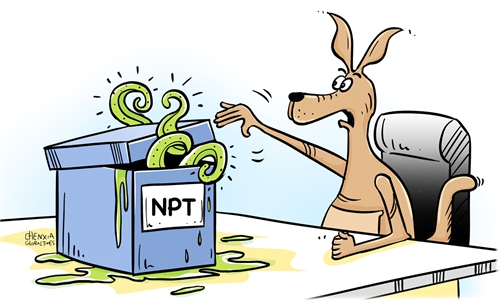
Shake down under. Illustration: Chen Xia/GT
September 15 marks the second anniversary of the signing of the AUKUS treaty between the US, the UK and Australia. When considering what Australia has gained from this, I would say nothing and less than nothing. In fact, the worst consequence of this is that it will deprive Australia of its sovereignty. It will also deprive its people of the very precious privilege of living in a nuclear weapon-free zone, which is truly a privilege, a great armor and a rare asset.
From the outset, the Australian government, together with the US and the UK, claimed that the AUKUS deal was not about nuclear weapons but about nuclear-powered submarines. However, this distinction is somewhat hair-splitting, as these submarines require the transfer of highly enriched uranium from the US and the UK to Australia to operate. Possessing and operating a nuclear-powered submarine, along with the transfer of related technologies and equipment from the US and the UK, including highly enriched uranium, will strip Australia of the rare privilege of its nuclear weapon-free zone bubble. This represents a significant blow to the fundamental and long-term interests of the Australian people.
In recent debates within Australia's ruling party, a decision was made to support AUKUS. However, I hope that the people of Australia will truly contemplate this decision. In today's world, nothing is more precious and valuable than living in the huge bubble of a nuclear free zone. This applies not only to Australia but also to other countries in the South Pacific region and, importantly, for the entire ASEAN region. It could trigger an arms race and bring a lot of unease to this neighborhood.
Another point to consider is the existing highest-level military alliance between the US and Australia. This alliance dictates that whenever a conflict breaks out anywhere in the world, if the US is involved, Australia is obligated to join in the fight alongside the US. Given this "blood treaty," one may question why Australia would still need to possess a nuclear submarine. By virtue of this alliance, the US, boasting the world's largest military and being the second-largest nuclear power, is duty obligated to defend Australia if it is threatened in a military operation. Promoting and operating the AUKUS treaty is all negative and minus for the Australian people. It does not add any value to Australia nor does it increase the US' obligation to defend Australia's fundamental interests in times of conflict. Instead, it has the potential to spark an arms race.
Moreover, there's another significant concern regarding AUKUS. The International Atomic Energy Agency (IAEA) is currently reviewing the AUKUS deal to determine whether it should receive approval. One of the dangers in this scenario is that the AUKUS deal, once approved and endorsed by the IAEA, could set a perilous precedent. This means that other countries may choose to follow a similar script and engage in nuclear submarine cooperation, creating more instability in the world.
Australia's decision to operate AUKUS and possess nuclear submarines is driven by one clear purpose: to constitute a bigger threat to China. However, it's essential to remember that China has been Australia's largest trading partner for many years, contributing significantly to Australia's revenues and profits. Many of the goods China imports from Australia are fungible, meaning China can easily find alternative suppliers. If Australia positions itself as a nation focused on threatening China, not only by being a partner in the "blood treaty" with the US but also by possessing nuclear submarines to project its military capabilities closer to the Chinese coastline, it will undoubtedly have a negative impact on how Australia is perceived and treated by the Chinese government, military and people.
It's high time for the Australian government and all the other countries, including the US and the UK to recognize the prevailing global trend, especially in the Asia-Pacific region, which emphasizes peace, stability and development over war and arms race. China does not want to have a war with anyone. In a real war, these submarines would not play any significant role in the protection of Australia's sovereignty and territorial integrity. It will more likely accelerate the pace leading toward Armageddon. Therefore, it's crucial for all nations, particularly those living in the huge bubble of a nuclear-free zone, to value peace and not allow anyone to deprive them of that privilege.
By joining AUKUS, Australia is effectively "selling its soul" to the US, and to a lesser extent, the US and the UK are seeking to profit significantly from this arms sale to Australia, creating a narrative suggesting an imminent aggression and invasion of Australia by some invisible force in the world. This narrative suggests that Australia's existing military capabilities are inadequate and that it requires greater power projection capabilities extending far beyond its coastal waters to China. It's not surprising that Washington and London want to misguide Canberra in this perilous direction. What is surprising is Canberra's willingness to embrace this fallacy and this war mongering coming from Washington and London.
The only way out for the people is to vote with their feet. Australia is a democracy and the people do have the right to vote. I do believe that the Australian people will eventually reach the conclusion that it is not in the best interest of Australia to operate nuclear submarines. I genuinely believe that the Australian people will come to the right conclusion that the nuclear-free zone holds great value for their fundamental, long-term and far-reaching interests.
The author is a chair professor at Soochow University and Vice President of the Center for China and Globalization. opinion@globaltimes.com.cn

